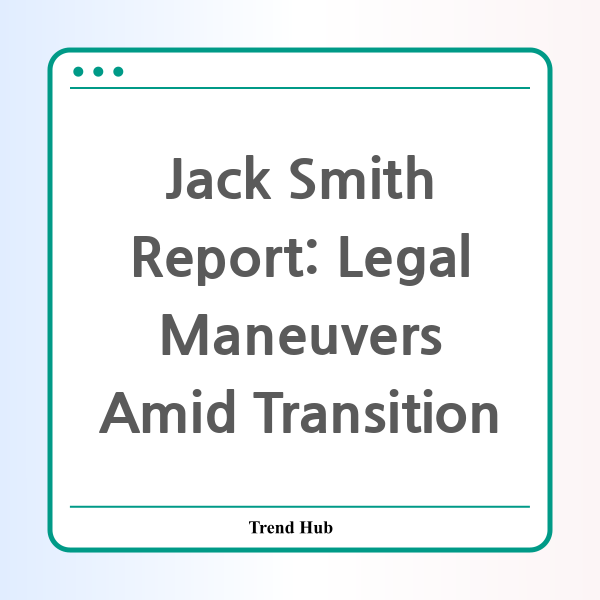* This website participates in the Amazon Affiliate Program and earns from qualifying purchases.

The Latest on the Jack Smith Report: What You Need to Know
As the political landscape shifts dramatically with the impending inauguration of Donald Trump, tensions regarding the release of Special Counsel Jack Smith's final report have reached a fever pitch. With lawyers for Trump’s co-defendants, Walt Nauta and Carlos De Oliveira, seeking urgent intervention from Judge Aileen Cannon, the situation presents a fascinating intersection of law, politics, and public scrutiny.
Understanding the Request to Block the Report
Nauta and De Oliveira's legal team has made a significant request: to block the public release of Smith’s report before January 10. This unorthodox legal maneuver is driven by their contention that releasing the report would unfairly taint any potential jurors and disrupt the fundamental norms of criminal justice.
The backdrop of this request is critical. Judge Cannon previously dismissed the case against Trump, claiming that Smith's appointment as Special Counsel was unconstitutional. In light of this, Nauta and De Oliveira's lawyers argue that Smith should not be allowed to freely release what they describe as a "single-sided" document, which could be interpreted as a government verdict against them—a notion contradictory to the presumption of innocence.
Political Implications of the Report's Release
Trump's legal representatives have gone a step further, urging Attorney General Merrick Garland to defer the release decision to Trump’s incoming attorney general. They believe that any report prepared by Smith, who they argue has political motivations, undermines the legitimacy of Trump's administration and the transition period itself.
Jack Smith's investigations surrounding Trump have been controversial and politically charged, prompting claims from Trump's attorneys that the release of the report would serve merely as a politically motivated stunt.
Concerns Over Fairness and Public Perception
The defendants have expressed fear that the public release of Smith's report could irreparably damage their reputations. Their lawyers claim that any negative public perception stemming from the report could prejudice potential jurors in future legal proceedings, making it difficult to mount a fair defense.
This strategic legal move highlights not only the often-blurred lines between law and politics but also showcases how the media narrative surrounding legal proceedings can greatly influence public opinion and individual rights.
What Comes Next?
As the situation unfolds, both Nauta and De Oliveira's legal teams have requested an emergency hearing with Judge Cannon to discuss their request. If successful, this move could effectively delay the report's release, ensuring that the defendants are not unfairly impacted during the transition of administration and legal proceedings.
The implications of this situation extend far beyond the courtroom. The interplay of legal decisions, political maneuvering, and media influence continues to shape the current political climate. As the January 10 date approaches, all eyes will be on the courts and how they handle this complex intersection of law and politics.
In conclusion, the legal battle surrounding the release of Jack Smith's report raises crucial questions about fairness, transparency, and the potential consequences of political lawfare. As events continue to evolve, the outcomes will undoubtedly influence not only the individuals involved but the broader political landscape as well.
* This website participates in the Amazon Affiliate Program and earns from qualifying purchases.